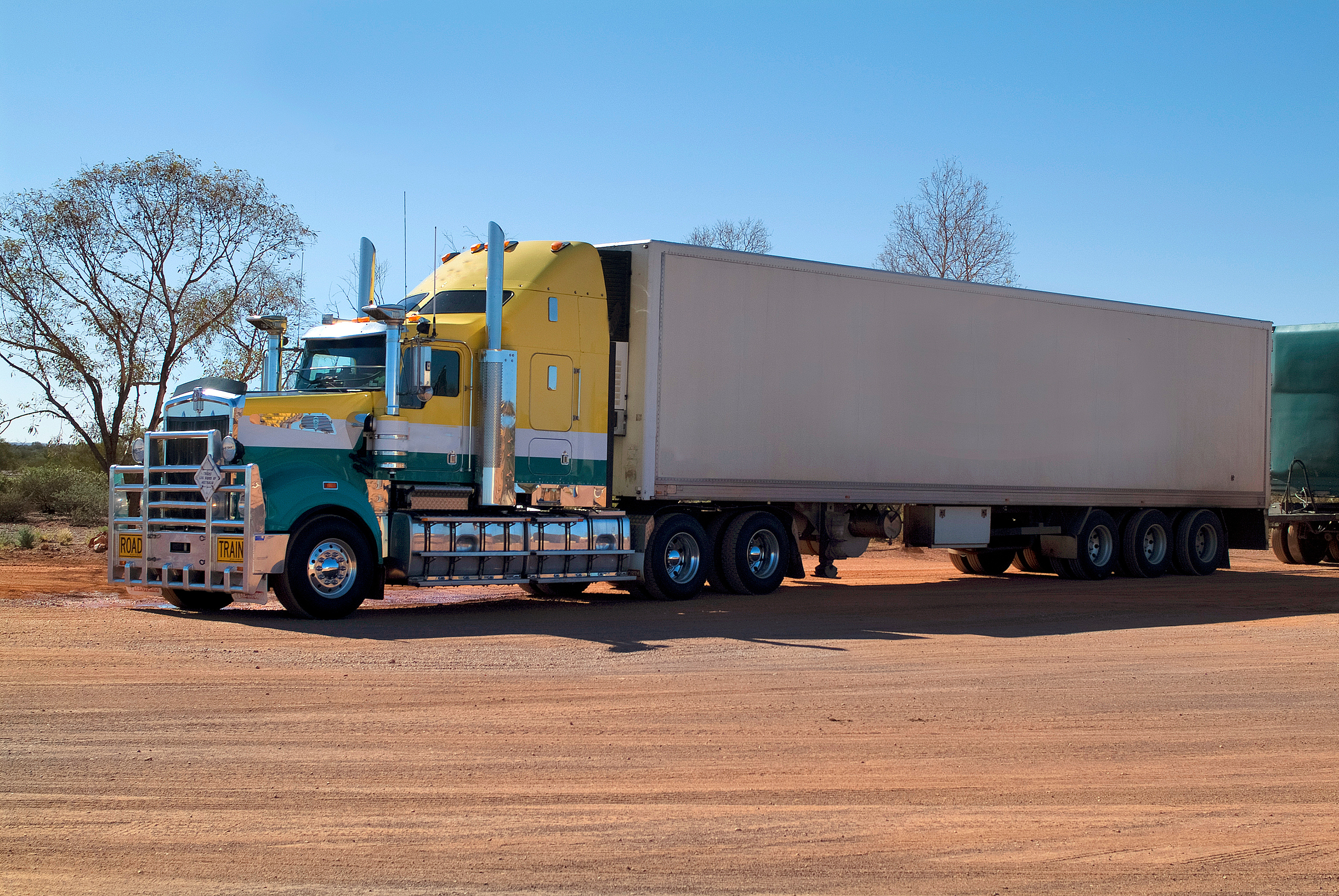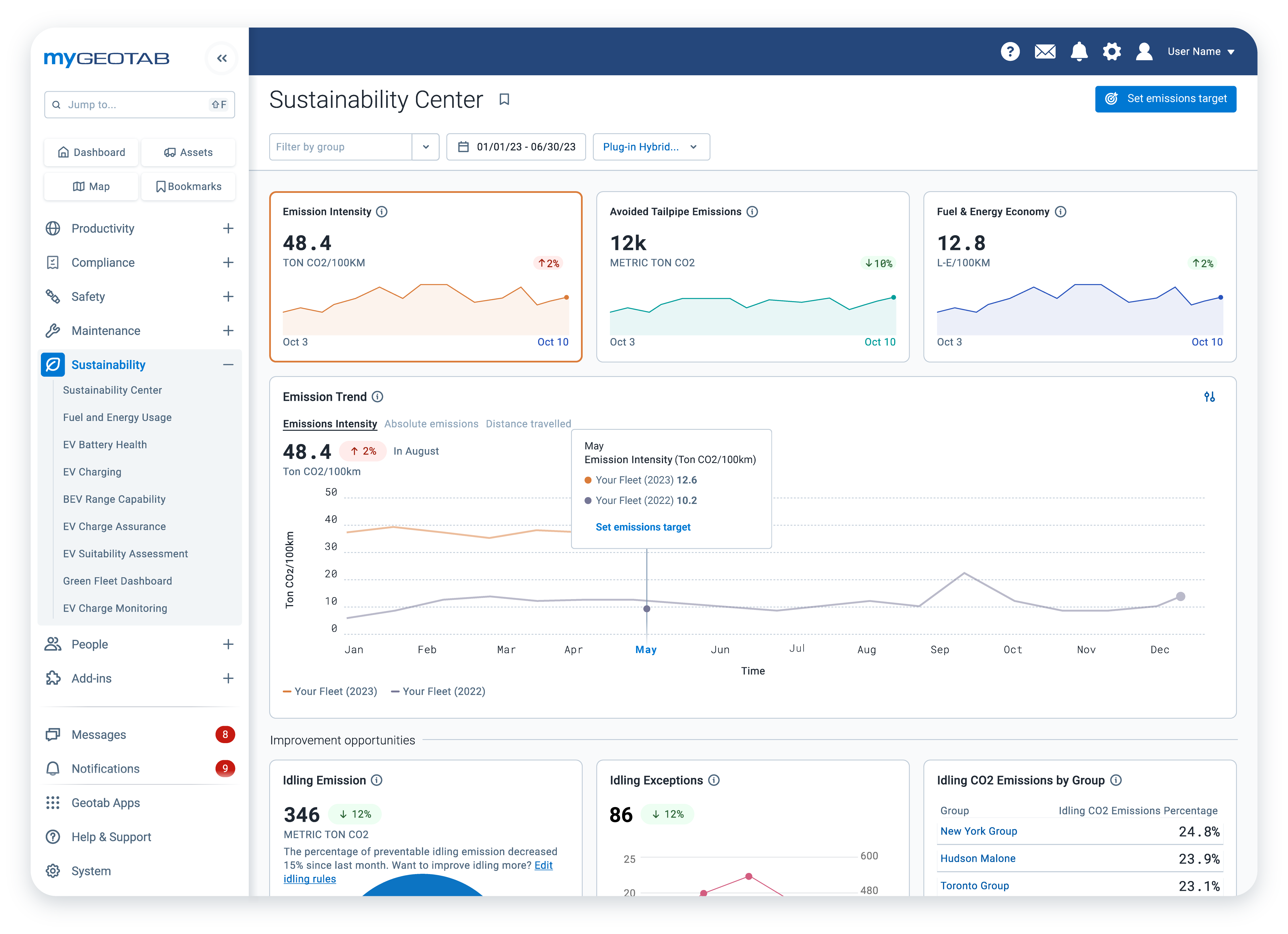The importance of creating a sustainable future with telematics
Learn how to create a sustainable future by using telematics for fleet management.

The automotive sector is one of the highest producers of greenhouse gas emissions globally. According to the World Resources Institute, 14% of annual greenhouse gas emissions derive from the transportation sector and 72% come directly from road vehicles. With CO2 emissions at an all-time high, companies today are in a unique position to measure their impact and take responsibility for their actions.
Geotab has long stood behind its fleet management pillars: Productivity, Optimisation, Safety, Compliance and Expandability. The sixth and newest pillar, Sustainability, reflects the role that telematics and connected vehicles play in helping fleets reduce their environmental footprint. However, one company can’t do it alone. The industry needs to collectively work together to find ways to improve operations and reduce emissions.
Implementing a fleet sustainability strategy
If you ask five people what “sustainability” generally means to them, you’ll likely get five different answers. Fleet sustainability however is a lot more focused and relevant to the automotive industry. It revolves around activities that reduce the environmental, social and economical impact of fleet vehicles.
A successful sustainability initiative likely incorporates these elements:
- Technology and innovation
- Laws, public policy and governance
- Economic and financial incentives
The fleet sustainability strategy you ultimately choose will depend on your overall goals, but most have a few things in common. The U.S. Department of Energy defines the four core principles of sustainable fleet management areas as the following:
- Right-sizing the fleet
- Increasing fleet fuel efficiency
- Reducing vehicle miles
- Optimising cost-effective alternative fuel use
Inform sustainable action with data insights
You want to become more sustainable but how and where do you start? This is a common question and the answer lies within telematics. In order to realise where costs can be cut, and where efficiency can be increased — data insights from telematics solutions can help support a fleet sustainability strategy. A few examples of how insights can deliver sustainability benefits include:
- Optimised routing for a wide variety of delivery and service vehicles
- Fuel management reporting to reduce idling and improve fuel efficiency for all vehicle types
- Utilisation and efficiency monitoring to right-size vehicles, ensuring the most efficient vehicle for the job
What do all the examples above have in common? Each data insight will help keep vehicles moving efficiently and avoid unnecessary miles and fuel consumption. According to the American Transportation Research Institute, roughly 60% of the cost of operating a vehicle is associated with fuel, tires, repair and maintenance. Routing can positively impact all these costs.
The degree of impact is determined by fleet specific conditions, but testimonial evidence suggests that the savings are meaningful. Watch the video below to learn how Geotab is positioning ourselves to champion measures at decarbonising the transportation sector.
A shift in the automotive industry is coming
We are at the very early stages of a technology transformation that will reinvent the automotive industry. Electrification is on the rise and will help minimise the impact a vehicle has on the environment associated with service life and at the same time generally have a lower total cost of ownership over the vehicle’s service life.
The number of makes and models of EVs has skyrocketed in the last few years and this trend is only expected to intensify. In 2021 alone, Tesla vehicles represented 20% of EV sales globally. While it is important to think through your fleet sustainability strategy, the shift towards EVs can be made easier with the use of technology to provide insights and even assess where it makes sense to go electric in the first place.
What is causing the market shift?
Several drivers are contributing to this transformational shift. The urgent need for climate action is leading to governments around the world advancing policy and regulations to enable a market shift to zero emission transportation. Globally, there has been an increase in incentives and tax structures to improve the business case of going electric, and several national and subnational governments are banning the sale of internal combustion vehicles over time. A few examples of this include:
- New Zealand: Effective July 1, 2022, drivers will receive a cash rebate when they purchase an electric or hybrid vehicle. The new scheme will also introduce additional fees on the price of vehicles that are not economically friendly and produce high levels of carbon dioxide emissions.
- Germany: To boost electric car sales, the government is providing subsidies of a maximum of €9,000. They have also set a goal of wanting to see 15 million electrified cars on the road by 2030.
- Norway: Norway has several EV incentives including no import taxes, an exemption from 25% VAT on purchases and no extra charges on ferries or toll roads. Additionally, as of 2025, petrol and diesel cars will be banned in the country.
- U.S.: All plug-in hybrid vehicles and EVs that were purchased in or after 2010 are eligible for a federal income tax credit up to a maximum of $7,500 USD.
- Canada: Canada has introduced a Zero-Emission Vehicles (iZEV) program, which offers point-of-sale-incentives for consumers that are subject to funding availability. Additionally, businesses can receive a 100% tax write-off for zero-emission vehicles which will help support business adoption.
Taking advantage of telematics-based services and insights
Telematics has made new services and insights available to fleets and municipalities. Data insights can provide fleet managers with a deep look into fleet operations that were once unattainable, reducing cost and increasing efficiency. Fleet operators can benchmark their operations against real world data, with a comparative group that is actually representative of the vehicle and driving style and conditions it operates in. At Geotab, there are several solutions and tools offered that are specifically created to help fleets of all sizes including:
- EV Suitability Assessments (EVSA)
- Geotab Keyless
- Fleet Safety Management
- Driver Safety Reporting
- CO2 Emissions Report
- Electric Vehicle Battery Degradation Tool
The time to act is now
Sustainability is becoming a significant consideration for governments and corporations, which will change the shape of many industries, especially the transportation sector. At the heart of this trend is an increasing global recognition that we need to reduce emissions. As noted by the UN, the global mean temperature in 2021 was around 1.08 above the pre-industrial era, and greenhouse gas and carbon dioxide levels in the atmosphere continue to rise.
Geotab is committed to helping fleets meet their sustainability objectives, by greening their fleets and reducing their environmental impact. Learn about Geotab’s fleet sustainability solutions and read our Sustainability Report to find out how we are making a difference.
The Geotab Team write about company news.
Related posts
.jpeg)

Geotab becomes a certified Telematics Monitoring Application Service Provider
April 1, 2025
3 minute read

Sustainability Centre: central hub for sustainable fleet management
January 28, 2025
2 minute read

Geotab at MEGATRANS discusses Cost Savings and Automation
September 24, 2024
1 minute read

Electric vehicle sales double in Australia: here are three trends in EV adoption
September 8, 2024
2 minute read

